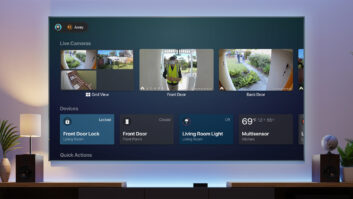 Artificial intelligence presents both significant opportunities and challenges when it comes to cyber security. We live in an increasingly interconnected world that combines smart devices and Internet of Things (IoT). However, as we embrace advanced technologies, we also open ourselves to potential vulnerabilities that those with malicious intentions can exploit.
Artificial intelligence presents both significant opportunities and challenges when it comes to cyber security. We live in an increasingly interconnected world that combines smart devices and Internet of Things (IoT). However, as we embrace advanced technologies, we also open ourselves to potential vulnerabilities that those with malicious intentions can exploit.
Professional installers should be well-versed in the realm of domestic cybersecurity threats to safeguard their clients’ homes. Typical vulnerabilities in domestic settings include; weak network security and passwords, malware and ransomware attacks, and social engineering or phishing attempts. Through these vulnerabilities, malicious actors can gain access to users’ networks which can, in turn, provide a platform to access users’ personal data and devices. Such attacks can threaten users’ privacy, identity, data, and devices and can even be used to expose physical home security through access to door locks, garages, and disabling security systems.
It is essential that professional installers conduct comprehensive risk assessments and implement strong cybersecurity standards for clients. This includes securing the network, routers and devices with:
- Latest protocols (such as WPA2/3)
- Strong encryption (such as AES)
- Strong passwords (long, complex and alphanumeric) that are regularly changed
- Multi-Factor Authentication (MFA)
- Isolated Guest access
- Robust firewalls
- Up-to-date software
- Software that secures the network, scans for threats, detects and prevents intrusion.
- Use only reputable DNS providers (which is ok with most Internet Service Providers).
- Schedule weekly reboots on PCs so that updates can be applied
- Disable UPnP (Universal Plug and Play).
- Where devices rely on Cloud Services, only select those that are reputable, GDPR and NDAA compliant

One only needs to look to the news to see the widespread industry leaks and data breaches of recent years, which serve as powerful reminders that robust cybersecurity practices are essential. That is why professional installers must educate homeowners about cybersecurity best practices and encourage regular security audits and updates.
Here are the main steps that pro installers should take to protect their customers from cyber security risks:
- Risk Assessment: Conduct a comprehensive risk assessment of the customer’s requirements, domestic environment, network, devices, and systems.
- Network Configuration: Configure the home network and devices with strong security settings. This includes setting up a secure Wi-Fi password, enabling encryption protocols and implementing a firewall to monitor and filter network traffic.
- Device Updates: Properly configure and update all installed devices with the latest firmware and security patches. Default passwords should be changed to unique, strong passwords, and two-factor authentication should be enabled whenever possible.
- User Education: Educate customers about cybersecurity best practices and the importance of maintaining strong passwords, recognizing phishing attempts, and avoiding suspicious downloads or links.
- Physical Security: Ensure that physical security measures are in place, such as securing equipment cabinets with locks and alarm sensors and placing cameras in optimal locations.
- Ongoing Support: Offer ongoing support to customers with device troubleshooting, updates, and maintenance. Monitor for security alerts, unusual activities, or potential breaches and promptly address them.
- Stay Informed: Keep abreast of the latest cybersecurity trends, and best practices through continuous learning and engagement.
At Swann, we feel that raising awareness about cybersecurity is essential to our industry. It is critical in building trust and promoting a safer digital environment for our users. The following steps can aid our progress:
- Education Programs: Cybersecurity training and education programs tailored for professional installers should cover topics such as common threats, best practices for securing networks and devices and incident response. Similarly, initiatives aimed at the public should provide accessible and practical information on cybersecurity risks, privacy protection, and safe online practices.
- Industry Collaboration: Collaboration between industry stakeholders, manufacturers, installers, experts, and government bodies. We must foster partnerships to develop guidelines, standards, and certifications that prioritize cybersecurity in the installation and use of smart home devices.
- Awareness Campaigns: Launch targeted awareness campaigns including online resources, webinars, workshops, and social media campaigns about cybersecurity risks, practical tips, and real-world examples. We collaborate with industry influencers, community, and media outlets to amplify the campaign’s reach.
- Clear Communication: Provide clear and concise documentation including detailed instructions for secure setup and steps to update firmware. Installers should communicate with customers about the importance of cybersecurity during installation and provide them with relevant educational materials or resources.
- Government Regulations: Governments can play a significant role in promoting cybersecurity awareness. These can include mandating cybersecurity training for installers, establishing data privacy regulations, and providing resources for public awareness campaigns. Governments should collaborate with our industry to develop best practices.
- Continuous Updates: Cybersecurity is a rapidly evolving field, so it’s important for installers and the public to stay updated on the latest threats and countermeasures through regular training sessions, webinars, conferences, and online resources.
As technology continues to progress and improve our lives, it also presents challenges in the cybersecurity landscape. While AI can enhance security defenses, it also means it can be utilized to develop more sophisticated attacks. It is our obligation as a security community to put in protocols to protect our consumers and deliver high-quality products that keep those consumers safe.
About Swann
Swann has been in the security business for 35 years. As the worldwide leader of wired, DIY security solutions, Swann helps its customers protect their homes, businesses, and garages no matter where life takes them. Founded in Melbourne, Australia, Swann creates innovative DIY security solutions. Swann is the only brand that offers a complete line-up of inter-connectable wired and wireless security solutions via the Swann Security app, wholly integrated with Hey Google and Alexa.
See also: 3 Ways Retailers Can Entice Holiday Shoppers To Buy Early













